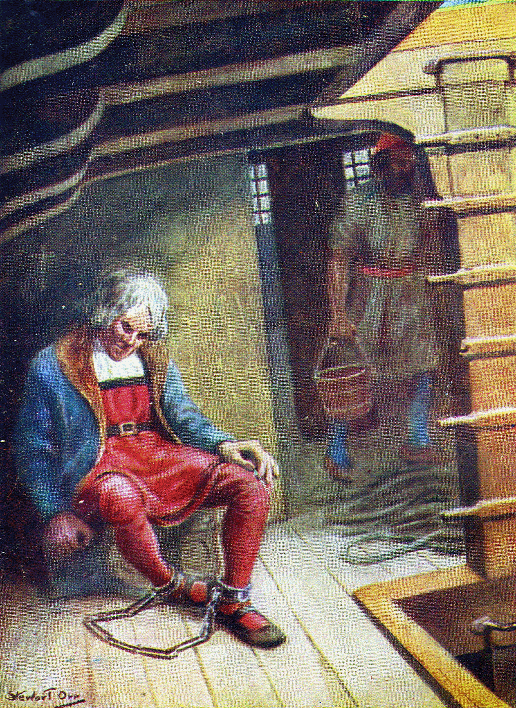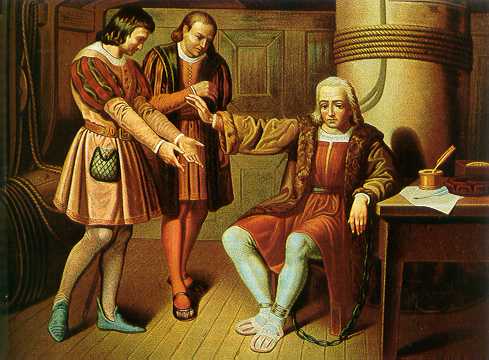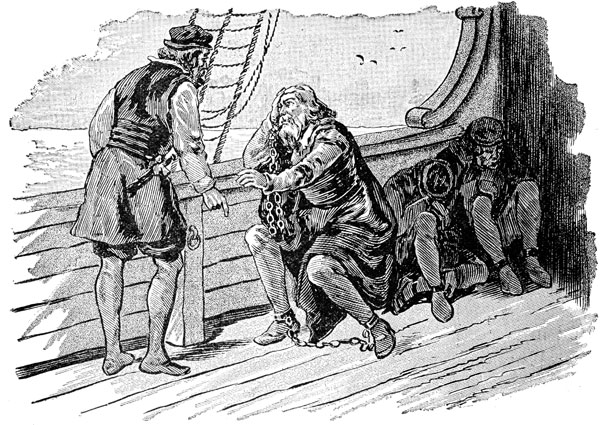Columbus made four voyates to America.
The first letter below is from Columbus's first voyage;
the second is from
his fourth & final voyage.
Discussion topics & questions:
1. How may or does Columbus's story serve as a
creation / origin
story for modern America? Compare and contrast
the two letters
as two stages of attitudes toward America by early European
explorers—and possibly by later Americans. What
presumptions or errors does he make, and how do these errors preview future
relations between Europeans and Indians?
1a.
How to judge Columbus's
attitude toward American Indians, whom Columbus mis-names
forever b/c he thinks he's in India or the East Indies (the Orient)?

2. How do
Columbus's attitudes and actions correspond to the Judeo-Christian
creation story of
Genesis?
If so, what conclusions about scripture, narrative, unconscious influence,
etc.?
2a. How do the narratives described
by Columbus's letters and by the Genesis-Eden story correspond to values or
symbols of
Romanticism, particularly American Romanticism? How may the
two stories correspond to the romance
narrative, particularly its
desire-loss cycle?
2b. If Columbus acts as though he
has rediscovered an Eden that has not fallen, how may this impulse conform
to Romantic values or desires?

3. How may the narrative of
rebirth-and-decline outlined by these letters also
potentially correspond to the immigrant narrative, which
largely figures the American Dream?

4.
Our current style is to regard Indians as voiceless victims of Europeans, but
what glimpses of Indians either as
independent peoples or as standing and speaking for themselves? How can we
speak fairly of the cultural differences without repeating Columbus's own
errors of judgment?

(First Letter)
The Letter of Columbus to Luis De Santangel*
Announcing His Discovery
(1493)
[*Luis de Santangel, finance minister to
King Ferdinand and Queen Isabel of Spain, had supported Columbus's
voyage.]
from USHistory.org:
http://www.ushistory.org/documents/columbus.htm
|
 |
[1.1] As I know you will be rejoiced at
the glorious success that our Lord has
given me in my voyage, I write this to tell you how in thirty-three days
I
sailed [from Spain] to the Indies
[West Indies or Caribbean]
with the fleet that the illustrious King and Queen, our
Sovereigns, gave me, where I discovered a great many islands, inhabited by
numberless people; and of all I have taken possession for their Highnesses
by proclamation and display of the Royal Standard without opposition.
To the
first island I discovered [in the
Bahamas] I gave the name of San Salvador, in commemoration
of His Divine Majesty, who has wonderfully granted all this. The Indians
call it Guanaham. The second I named the Island of Santa Maria de
Concepcion; the third, Fernandina; the fourth, Isabella; the fifth, Juana;
and thus to each one I gave a new name.
When I came to Juana, I followed the
coast of that isle toward the west, and found it so extensive that I thought
it might be the mainland, the province of Cathay
[Cathay = China—Columbus
was seeking a route to Asia]; and as I found no towns
nor villages on the sea-coast, except a few small settlements, where it was
impossible to speak to the people, because they fled at once, I continued
the said route, thinking I could not fail to see some great cities or towns;
and finding at the end of many leagues that nothing new appeared, . . I determined not to wait there longer, and turned back to a
certain harbor whence I sent two men to find out
whether there was any king or large city. They
explored for three days, and found countless
small communities and people, without number, but with no kind of government,
so they returned.
[1.2]
I heard from other Indians I had already taken that this land was an
island, and thus followed the eastern coast for one hundred and seven
leagues, until I came to the end of it. From that point I saw
another isle to the eastward, at eighteen leagues'
distance, to which I gave the name of Hispaniola
[Island of modern nations of Haiti and Dominican
Republic]. I went thither and followed its northern coast to the east . . . .
Island of Hispaniola, now home to nations of
Dominican Republic & Haiti
[1.3] This island, like all the others, is most extensive. It has
many
ports along the sea-coast excelling any in Christendom—and many fine,
large, flowing rivers. The land there is elevated, with
many mountains and
peaks incomparably higher than in the center isle. They are
most beautiful,
of a thousand varied forms, accessible, and full of trees of endless
varieties, so high that they seem to touch the sky, and I have been told
that they never lose their foliage. I saw them as green and lovely as trees
are in Spain in the month of May. Some of them were covered with blossoms,
some with fruit, and some in other conditions, according to their kind.
The
nightingale [a bird native to
Europe but not America] and other small birds of a thousand kinds were singing in the
month of November when I was there. There were
palm trees of six or eight
varieties, the graceful peculiarities of each one of them being worthy of
admiration as are the other trees, fruits and grasses. There are
wonderful
pine woods, and very extensive ranges of meadow land. There is honey, and
there are many kinds of birds, and a great variety of fruits. Inland there
are numerous mines of metals and innumerable people.
[1.4] Hispaniola* is a marvel.
Its hills and mountains, fine plains and open country, are
rich and fertile
for planting and for pasturage, and for building towns and villages. The
seaports there are incredibly fine, as also the magnificent rivers, most of
which bear gold. . . . There are many spices and
vast mines of gold and other metals in this
island. They [the native
peoples] have no iron, nor steel, nor weapons, nor are they fit for
them, because although they are well-made men of commanding stature, they
appear extraordinarily timid. The only arms
[weapons] they have are sticks of cane,
cut when in seed, with a sharpened stick at the end, and they are afraid to
use these. Often I have sent two or three men ashore to some town to
converse with them, and the natives came out in great numbers, and as soon
as they saw our men arrive, fled without a moment's delay although I
protected them from all injury. [*Hispaniola =
island now governed by Haiti & Dominican Republic; see map above]
[1.5] At every point where I landed, and succeeded in talking to them,
I gave
them some of everything I had—cloth and many other things—without
receiving anything in return, but they are
a hopelessly timid people. It is
true that since then they have gained more confidence and are losing this fear,
they are so unsuspicious and so generous with what they possess, that no one
who had not seen it would believe it. They never refuse anything that is
asked for. They even offer it themselves, and show so much love that they
would give their very hearts. Whether it be anything of great or small
value, with any trifle of whatever kind, they are satisfied. I forbade
worthless things being given to them, such as bits of broken bowls, pieces
of glass, and old straps, although they were as much pleased to get them as
if they were the finest jewels in the world. One sailor was found to have
got for a leathern strap, gold of the weight of two and a half castellanos
[gold coins],
and others for even more worthless things much more; while for a few blancas
[coins] they would give all they had, were it two or three castellanos
[coins] of pure gold
or an arroba or two [30-60 pounds]
of spun cotton. Even bits of the broken hoops of wine
casks they accepted, and gave in return what they had, like fools, and it
seemed wrong to me. I forbade it, and gave a thousand good and pretty things
that I had to win their love, and to induce them to become Christians, and
to love and serve their Highnesses and the whole Castilian
[Spanish] nation, and help
to get for us things they have in abundance, which are necessary to us. They
have no religion, nor idolatry, except that they all believe power and
goodness to be in heaven. They firmly believed that I, with my ships and
men, came from heaven, and with this idea I have
been received everywhere,
since they lost fear of me.
[1.6] They are, however,
far from being ignorant. They are
most ingenious men, and navigate these seas in a wonderful way, and describe
everything well, but they never before saw people wearing clothes, nor
vessels like ours. Directly I reached the Indies in the
first isle I
discovered, I took by force some of the natives, that from them we might
gain some information of what there was in these parts; and so it was that
we immediately understood each other, either by words or signs. They are
still with me and still believe that I come from heaven. They were the first
to declare this wherever I went, and the others ran from house to house, and
to the towns around, crying out, "Come ! come! and see the man from heaven!"
Then all, both men and women, as soon as they were reassured about us, came,
both small and great, all bringing something to eat and to drink, which they
presented with marvelous kindness.
[1.7] In these isles there are a great many
canoes, something like rowing boats, of all sizes, and most of them are
larger than an eighteen-oared galley. They are not so broad, as they are
made of a single plank, but a galley could not keep up with them in rowing,
because they go with incredible speed, and with these they row about among
all these islands, which are innumerable, and carry on their commerce. I
have seen some of these canoes with seventy and eighty men in them, and each
had an oar.
[1.8]
In all the islands I observed little difference in the
appearance of the people, or in their habits and language, except that they
understand each other, which is remarkable. Therefore I hope that their
Highnesses will decide upon the conversion of these people to our holy
faith, to which they seem much inclined. I have
already stated how I sailed one hundred and seven leagues along the
sea-coast of Juana, [hearing of]
two provinces where I did not go, one of which they call Avan,
the home of men with tails.
[1.9] This
other [island],
Hispaniola, is larger in circumference . . . . This is worth having,
and must on no account be given up. I have taken possession of all these
islands, for their Highnesses, . . . who can command them as
absolutely as the kingdoms of Castile [Spain]. In Hispaniola, in the most convenient
place, most accessible for the gold mines and all commerce with the mainland
on this side or with that of the great Khan [ruler
of China], on the other, with which there
would be great trade and profit, I have taken possession of a large town,
which I have named the City of Navidad [destroyed
the next year]. I began fortifications there which
should be completed by this time, and I have left in it men enough to hold
it, with arms, artillery, and provisions for more than a year; and a boat
with a master seaman skilled in the arts necessary to make others; I am so
friendly with the king of that country that he was proud to call me his
brother and hold me as such. . . .
[1.10] In all these islands
the men seem to be satisfied with one wife except they allow as many as
twenty to their chief or men. The women appear to me to work harder than the
men*, and so far as I can hear they have nothing of their own, for I think I
perceived that what one had others shared, especially food. In the islands
so far, I have found no monsters, as some expected, but, on the contrary,
they are people of very handsome appearance. They are
not black as in
Guinea [Africa], though their hair is straight and coarse, as it does not grow where
the sun's rays are too ardent. And in truth the sun has extreme power here .
. . . In these
islands there are mountains where the cold this winter was very severe, but
the people endure it from habit, and with the aid of the
meat they eat with
very hot spices.
[*women
work harder = common European observation
concerning Native Americans (cf.
Jefferson and
Cabeza de Vaca); insight
may derive from sexual division of labor, with men resting from hunting]
[1.11] As for monsters [humans
with deformities], I have found no trace of them except at the point in
the second isle as one enters the Indies, which is inhabited by a people
considered in all the isles as most ferocious, who eat human flesh
[enduring
Euro fear of Native American cannibalism].
They
possess many canoes, with which they overrun all the isles of India
[i.e., the Caribbean islands],
stealing and seizing all they can. They are not worse looking than the
others, except that they wear their hair long like women, and use bows and
arrows of the same cane, with a sharp stick at the end for want of iron, of
which they have none. They are ferocious compared to these other races, who
are extremely cowardly; but I only hear this from the others. . . .
[1.12] To speak, in conclusion, only
of what has been done during this hurried voyage,
their Highnesses will see
that I can give them as much gold as they desire, if they will give me a
little assistance, spices, cotton, as much as their Highnesses may command
to be shipped, and mastic [aromatic gum
or resin] as much as their Highnesses choose to
send for, which until now has only been found in Greece, . . . and
as many slaves as they choose to send for, all heathens.
. . . Many other things of value will be discovered by the men I left behind
me . . . .
[1.13] The eternal and almighty God,
our Lord, it is Who gives to all who walk in His way, victory over things
apparently impossible, and in this case signally so, because
although these
lands had been imagined and talked of before they were seen, most men
listened incredulously to what was thought to be but an idle tale. But our
Redeemer has given victory to our most illustrious King and Queen, and to
their kingdoms rendered famous by this glorious event, at which all
Christendom should rejoice, celebrating it with great festivities and solemn
Thanksgivings to the Holy Trinity, with fervent prayers for
the high
distinction that will accrue to them from turning so many peoples to our
holy faith; and also from the temporal benefits that not only Spain but all
Christian nations will obtain. Thus I record what has happened in a brief
note written on board the Caravel, off the Canary Isles, on the 15th
of February, 1493.
Yours to command,
THE ADMIRAL
![]()







